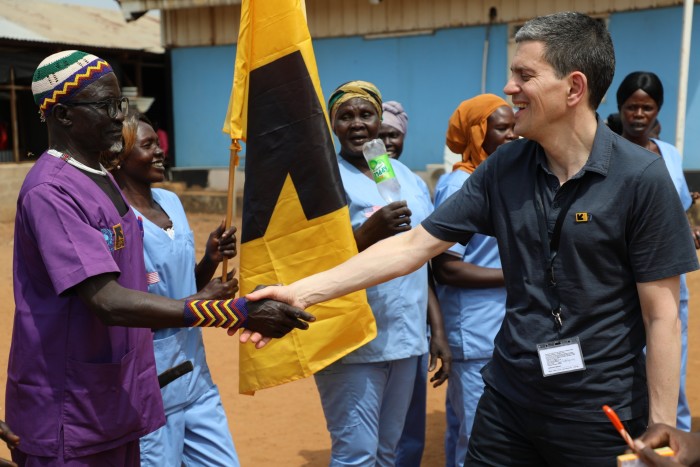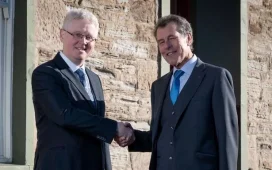David Miliband has said the UK government’s aid cuts are a “blow to Britain’s reputation” globally and that there “couldn’t be a worse time” for funding to fall because humanitarian need is growing and extreme poverty is on the rise.
The chief executive of the International Rescue Committee (IRC) and former British foreign secretary also urged the UK to channel its remaining aid spending to recipients in need overseas, rather than using the money to house refugees domestically.
His intervention comes after Sir Keir Starmer announced he would cut the UK’s aid budget from 0.5 per cent of gross national income to 0.3 per cent from 2027 in order to fund an increase in defence spending.
The decision “was a blow to Britain’s reputation”, Miliband told the Financial Times, adding: “The prime minister effectively said the same thing . . . he didn’t want to do it.”
However, he stressed that “if they’re going to 0.3 [per cent], let’s really make it 0.3”, rather than funnelling a significant proportion of that budget towards accommodation for refugees and asylum seekers in Britain — even though such spending “technically qualifies” as aid under international rules.
An FT analysis found that close to half the newly reduced UK aid budget is in line to be spent on housing refugees and asylum seekers in Britain.
Miliband has run the IRC, a global humanitarian NGO headquartered in New York, since 2013. He left UK parliament after losing the race to become Labour leader to his brother Ed, who is now the British energy secretary.
Labour’s election triumph last summer prompted speculation among senior party figures that Miliband could return to a frontline UK government role, potentially as a politically appointed ambassador like Lord Peter Mandelson.
Miliband did not rule out a future return to British politics, demurring: “I always try and duck those questions.”
He warned the global aid sector was facing a “double challenge” of “growing humanitarian need” in the worst-afflicted hotspots and “the aid budgets being reduced”, adding that the former meant the latter could not come at a “worse time”.
Alongside Britain, nations including France, Switzerland and the US are all cutting aid programmes.
In the US — which Miliband highlighted had accounted for $4 of every $10 spent on aid globally up until now — Donald Trump is permanently axing government grants to almost 10,000 organisations as part of a plan to dismantle Washington’s foreign assistance programme; only funding for “life-saving” humanitarian work remains intact.
This hits the IRC, which relies on the US government for 30-40 per cent of its annual budget of about $1.5bn, Miliband said.
The majority of the IRC’s funding from Washington — $400mn each year — was allocated for domestic use on refugees within the US. This had been halted “because there are no refugees coming into the country at the moment” under Trump’s tougher border controls, Miliband added.
Fewer than half the IRC’s international programmes have some kind of waiver “because they’re considered life-saving”. Miliband is now awaiting the conclusion of a 180-day US administration review of the international intergovernmental bodies that receive its support.

Yet the global need for its work remains acute. He warned that “extreme poverty is rising” in the 20 countries on the IRC’s emergency list, despite there having been a “massive reduction in global poverty” overall in the past 25 years.
More than 80 per cent of people in humanitarian need worldwide live in those 20 countries alone.
Miliband said businesses should play a role in plugging the gap left by governments by stepping in to offer philanthropy, brainpower and assistance with supply chains and infrastructure. “Business won’t be able to continue to bear the blessings of globalisation if it doesn’t bear the burdens.”
Aid cuts were a “microcosm” of a wider set of issues blighting an international system that was “at risk of falling further apart”, he said, adding that the world is facing a “very dangerous time”.
Miliband added: “There is a real issue about where there’s western absence, there’s a vacuum.”
This western retreat will mean that nations such as China, which have an established presence in much of the developing world, find “their position is stronger” still.
It is also likely to feed into a slow-burn transition that has been afoot since the “clear post-1990s American supremacy”, he said.
While some foreign policy analysts talk of a shift to a “multi-polar” international order, Miliband believes that “multi-aligned” is a better description: a world that is becoming “much more transactional, much more fluid, much more networked, much more sharp-elbowed”.
Major issues, such as health, climate or trade, would give rise to a shifting patchwork of coalitions with varying cast lists, replacing nations joining more stable established alliances, he predicted.
Despite the challenges, Miliband remains an optimist. Western ideals are “still strong”, particularly among populations that do not enjoy widespread freedoms. This is true even if those ideals are “under attack”, and the institutions that underpin them are “struggling”, as western countries are riven by division.
“There’s an opportunity for the UK in this,” he argued, “which is to be strong inside western coalitions, but also to be strong beyond them”.
Britain could play a “distinctive” role — including by parlaying its “very close” relationship with the US, Miliband said.
The UK’s Foreign, Commonwealth and Development Office declined to comment. International development minister Baroness Jenny Chapman, who was appointed after her predecessor Anneliese Dodds quit in protest at the cuts to the aid budget, said last week that the UK government is “committed to modernising our approach with less money: working with our partners in new ways to maximise our impact”.








